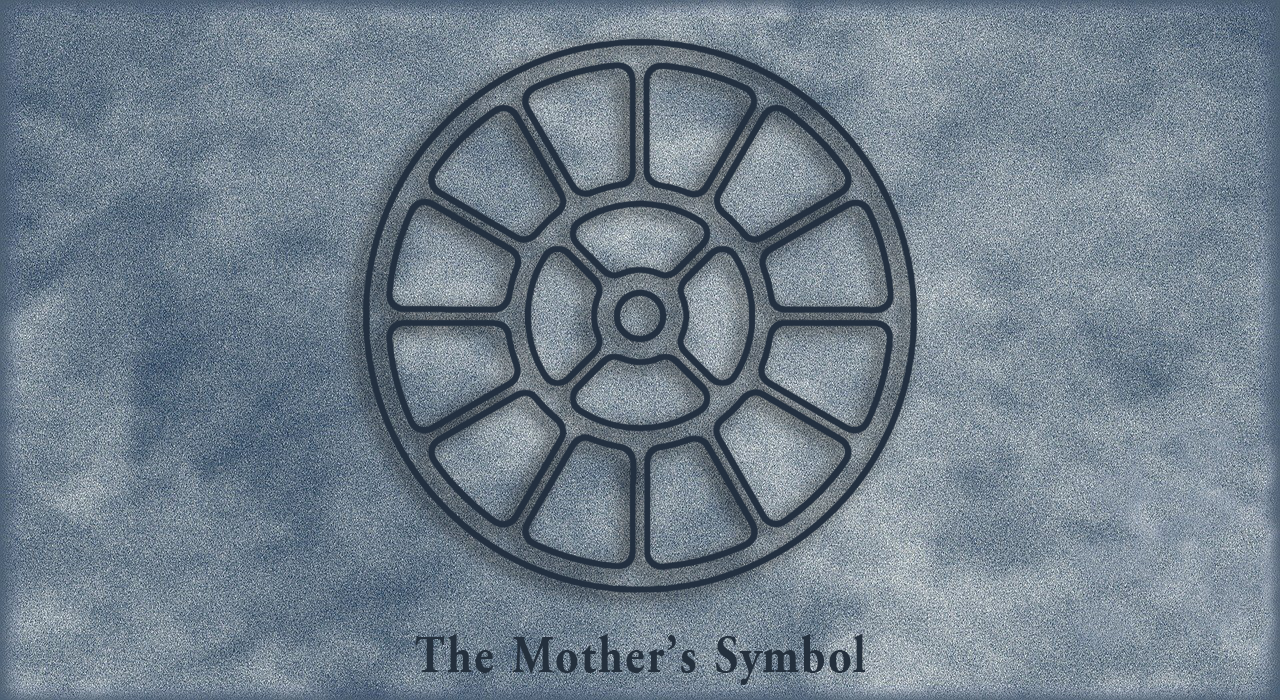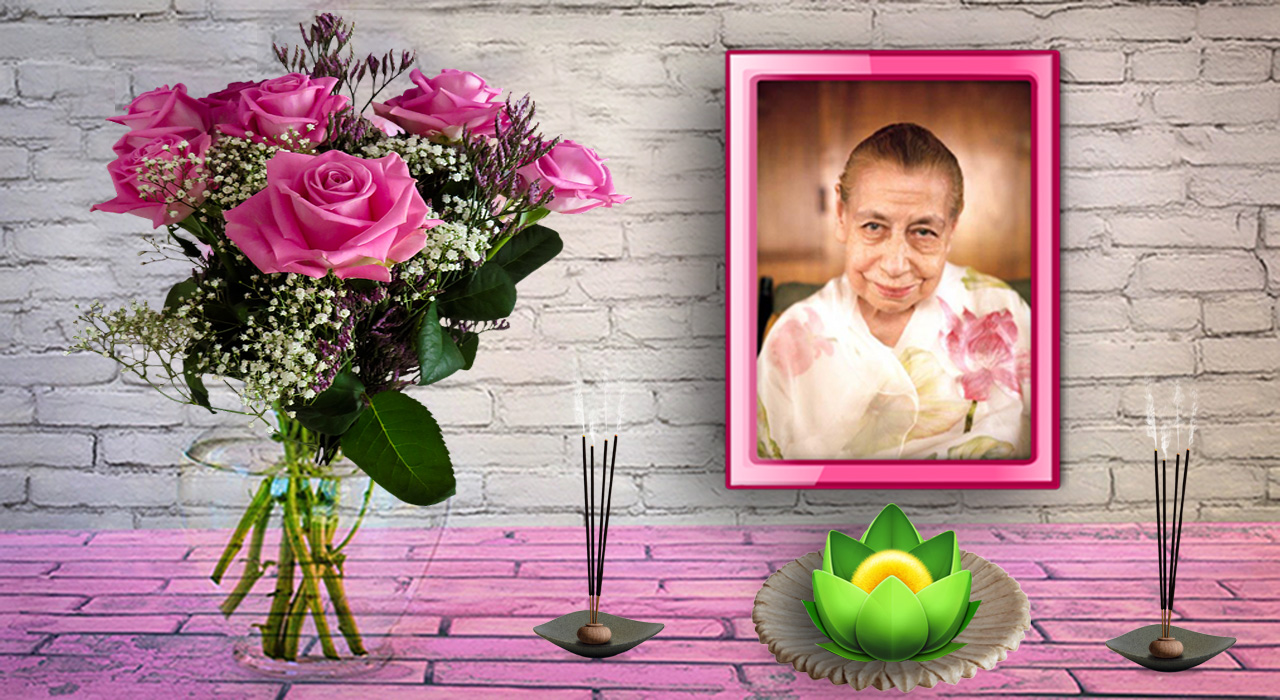

The Mother was born Mirra Alfassa in Paris on 21 February 1878. Mirra was the daughter of the banker Maurice Alfassa (born in Adrianople, turkey), and Mathilde Ismaloun (born in Alexandria, Egypt). Maurice, his wife, and their son Matteo (born in Alexandria) emigrated from Egypt to France a year before Mirra's birth.
Her early education was given at home. A pupil at the Academie Julian, she became an accomplished artist, and also excelled as a pianist and writer.
Interested in occultism, she visited Tlemcen, Algeria, in 1905 and 1906 to study with the adept Max Theon and his wife. Her primary interest, however, was spiritual development. In Paris she founded a group of spiritual seekers and gave talks to various groups.
In 1914 the Mother voyaged to Pondicherry to meet Sri Aurobindo, whom she at once recognised as the one who for many years had inwardly guided her spiritual development. After a stay of eleven months she was obliged to return to France due to the outbreak of the First World War. A year later she went to Japan for a period of four years.
In April 1920 the Mother rejoined Sri Aurobindo in Pondicherry. Sri Aurobindo addressed Mirra Alfassa as "The Mother". Since then she is known as the Mother. When the Sri Aurobindo Ashram was formed in November 1926, Sri Aurobindo entrusted its full material and spiritual charge to the Mother. Under her guidance, which continued for nearly fifty years, the Ashram grew into a large, many-faceted spiritual community. In 1952 she established Sri Aurobindo International Centre of Education, in 1960 she formed the Sri Aurobindo Society with herself as its President, and in 1968 an international township, Auroville. The Mother left her body on 17 November 1973.


The following quotes are from the Collected Works of the Mother (CWM). Volume and page number follow each quotation.
CWM published by Sri Aurobindo Ashram Publication Department, Pondicherry-605002. Printed at Sri Aurobindo Ashram Press, Pondicherry, India. Year of publication 2003.

Since the beginning of the earth, wherever and whenever there was the possibility of manifesting a ray of the Consciousness, I was there. (CWM 13:37)

How I Became Conscious of My Mission When and how did I become conscious of a mission which I was to fulfil on earth? And when and how I met Sri Aurobindo?
These two questions you have asked me and I promised a short reply.
For the knowledge of the mission, it is difficult to say when it came to me. It is as though I were born with it, and following the growth of the mind and brain, the precision and completeness of this consciousness grew also.
Between 11 and 13 a series of psychic and spiritual experiences revealed to me not only the existence of God but man’s possibility of uniting with Him, of realising Him integrally in consciousness and action, of manifesting Him upon earth in a life divine. This, along with a practical discipline for its fulfilment, was given to me during my body’s sleep by several teachers, some of whom I met afterwards on the physical plane.
Later on, as the interior and exterior development proceeded, the spiritual and psychic relation with one of these beings became more and more clear and frequent; and although I knew little of the Indian philosophies and religions at that time I was led to call him Krishna, and henceforth I was aware that it was with him (whom I knew I should meet on earth one day) that the divine work was to be done.
In the year 1910 my husband came alone to Pondicherry where, under very interesting and peculiar circumstances, he made the acquaintance of Sri Aurobindo. Since then we both strongly wished to return to India—the country which I had always cherished as my true mother-country. And in 1914 this joy was granted to us.
As soon as I saw Sri Aurobindo I recognised in him the well-known being whom I used to call Krishna.... And this is enough to explain why I am fully convinced that my place and my work are near him, in India. (CWM 13:39)

The central circle represents the Divine Consciousness.
The four petals represent the four powers of the Mother.
The twelve petals represent the twelve powers of the Mother manifested for Her work.
The central circle represents the Supreme Mother, the Mahashakti.
The four central petals are the four aspects of the Mother—and the twelve petals, Her twelve attributes.
The Mother (CWM 13:63-4)
The four aspects of the Mother are Maheshwari, Mahakali, Mahalakshmi, Mahasaraswati.
Four great Aspects of the Mother, four of her leading Powers and Personalities have stood in front in her guidance of this universe and in her dealings with the terrestrial play.
One is her personality of calm wideness and comprehending wisdom and tranquil benignity and inexhaustible compassion and sovereign and surpassing majesty and all-ruling greatness.
Another embodies her power of splendid strength and irresistible passion, her warrior mood, her overwhelming will, her impetuous swiftness and world-shaking force.
A third is vivid and sweet and wonderful with her deep secret of beauty and harmony and fine rhythm, her intricate and subtle opulence, her compelling attraction and captivating grace.
The fourth is equipped with her close and profound capacity of intimate knowledge and careful flawless work and quiet and exact perfection in all things.
Wisdom, Strength, Harmony, Perfection are their several attributes and it is these powers that they bring with them into the world, manifest in a human disguise in their Vibhutis and shall found in the divine degree of their ascension in those who can open their earthly nature to the direct and living influence of the Mother. To the four we give the four great names, Maheshwari, Mahakali, Mahalakshmi, Mahasaraswati.
Sri Aurobindo (CWSA 32:17-18)
The twelve attributes of the Mother are as follows:
Sincerity: To be constantly the true flame that burns like an offering.
Humility: We are nothing in ourselves.
Gratitude: The whole being offers itself to the Lord in absolute trust.
Perseverance: The decision to go to the very end.
Aspiration: We must aspire with all our being for the manifestation to come soon and complete.
Receptivity: The whole being is aware of the Divine Will and obeys it.
Progress: The will for progress by the urge towards perfection.
Courage: When we trust in the Divine Grace we get an unfailing courage.
Goodness: Good is all that helps the individual and the world towards their Divine Fullness.
Generosity: Gives and gives oneself without bargaining.
Equality: The Supreme Divine Nature is founded on equality.
Peace: The Divine is Supreme Peace. Be with the Divine and you will be in peace.
© Grateful acknowledgement to Sri Aurobindo Ashram Trust, Pondicherry, India for the copyrighted materials.


